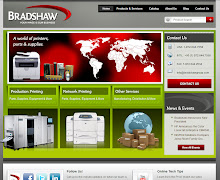With four generations now in the workplace, employers are realizing the importance of understanding the traits and values that each generation offers and how these traits and values impact the communication between employees within an organization. At Bradshaw, a leading distributor of printer parts, supplies and equipment, we are fortunate to have employees in each one of these categories which allows us to be well rounded. Below is a list of some of the different generations which you may encounter when working in a large company.
The Silent Generation: These are employees born between 1925–1945; more commonly called Traditionalists. This generation lived through the Great Depression and World War II. Therefore, Traditionalists typically bring frugality, structure, loyalty and a deep sense of responsibility and sacrifice into an organization. They often measure performance on the number of hours worked. Traditionalists prefer face-to-face communication and typically do not allow their personal life to integrate into work.
Baby boomers: These are employees born between 1946-1964 and are often referred to as the “me” generation. This generation strived for individual rights in society and the workplace by marching against “the establishment” to bring equal rights and an end to the Vietnam War. Baby Boomers are workaholics, competitive and independent in their work.
Generation X: These are employees born between 1965–1976 and are referred to as Generation X. These kids grew up in a time when the divorce rate doubled and the number of mothers raising children and working outside the home grew. They were often left on their own after school, saw the invention of the personal computer and witnessed multiple recessions. Generation X employees often bring self-management skills, a practical approach to problems and cynicism into the workforce.
Millennials: This is the largest generation currently in the workforce born between 1977–1998. This generation was raised by Baby Boomers so their relationships with their children was a peer-like relationship therefore they were constantly coached, praised and encouraged for participation rather than for accomplishments. Millennials bring confidence and flexibility to an organization. They are computer and internet-savvy which means that they are always connected and want regular communication from their supervisor.
Knowing and understanding the different generation traits and values can open the lines of communication within an organization and allow the organization to be more productive.


No comments:
Post a Comment